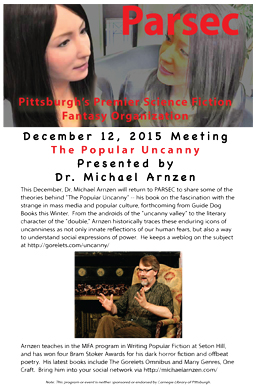Shortly before my presentation on The Popular Uncanny at PARSEC last month, Heidi Ruby Miller interviewed me about the subject for their newsletter, SIGMA. You can read the full interview in .pdf format here; an excerpt follows…
Excerpt:
Miller: Why should we care about the uncanny, popular or not?Arnzen: The uncanny has been becoming more and more “popular” in academic circles, as a way to explain the weirdness of everyday life…so I think the issues I raise in it need to be out there.
But I think we instinctively do care about it when we experience it. When we feel the uncanny we are stunned with uncertainty, intrigued by the puzzlement of experiencing the disconnect between familiarity and unfamiliarity. The creepiness of it can lead to a paranoid feeling that makes us wonder. And while paranoia is neurotic, it can also be a good thing for culture to do a “double take” once in a while; I’d like to think that if we focus on instances of the uncanny, we might be answering a call from within ourselves to reconsider our popular assumptions — maybe even to challenge them and “rewrite” the rules of the proverbial game in a positive way.
On the other hand, there can also often be a mildly conservative or even dangerously reactionary impulse at play when people respond to the uncanny. It can generate a desire to master or “control” the very feelings it conjures. Often that desire engages in a process of “demonizing” the cause of it as something “monstrous” rather than acknowledging that the feeling speaks to something unstable from within. Freud, treating all this as unconscious, said that the uncanny was “the return of the repressed” and when that “return” happens, triggering the dread of the uncanny, suddenly our mind sweeps in and wishes to contain or repress the cause of it all over again.
Read the rest of the interview.
Visit PARSEC: Pittsburgh’s Premier Science Fiction & Fantasy Organization.
Visit the interviewer, Heidi Ruby Miller.

